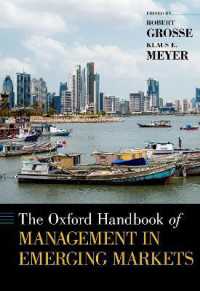- ホーム
- > 洋書
- > 英文書
- > Literary Criticism
Full Description
Rhetorical training was the central component of an elite Roman man's education. Controversiae (declamations), imaginary courtroom speeches in the character of a fictional or historical individual, were the most advanced exercises in the standard rhetorical curriculum. The Major Declamations is a collection of nineteen full-length Latin speeches attributed in antiquity to Quintilian but most likely composed by a group of authors in the second and third centuries CE. Though there has been a recent revival of interest in Greco-Roman declamation, the Major Declamations has generally been neglected.
Ethics, Identity, and Community in Later Roman Declamation is the first book devoted exclusively to the Major Declamations and its reception in later European literature. It argues that the fictional scenarios of the Major Declamations enable the conceptual exploration of a variety of ethical and social issues. These include the construction of authority (Chapter 1), the verification of claims (Chapter 2), the conventions of reciprocity (Chapter 3), and the ethics of spectatorship (Chapter 4). Chapter 5 presents a study of the reception of the collection by the Renaissance humanist Juan Luis Vives and the eighteenth century scholar Lorenzo Patarol. A brief postscript surveys the use of declamatory exercises in the contemporary university and will inform current work in rhetorical studies.
Contents
Acknowledgments ; Introduction: Constructing a Roman Sophistopolis ; Part I: Law, Ethics, and Community in Sophistopolis ; Chapter 1: Authority ; Chapter 2: Verification ; Chapter 3: Reciprocity ; Chapter 4: Visuality ; Part II: Responding to the Major Declamations ; Chapter 5: Vives' "For The Stepmother" and Patarol's Antilogiae ; Postscript: Declamation, Controversiality, and Contemporary Pedagogy ; Appendix 1: Text and translation of Lorenzo Patarol, Antilogia 1, "For the Stepmother Against the Blind Son" ; Appendix 2: Text and Translation of the Themes of the Major Declamations ; Bibliography ; Index








